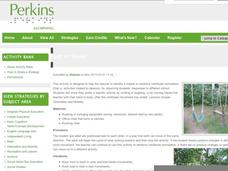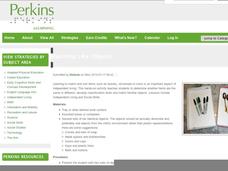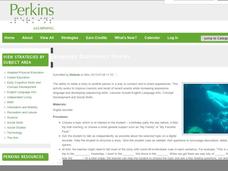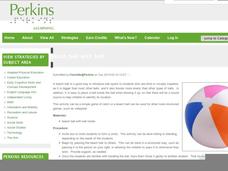Perkins School for the Blind
Build a Word
Get out those scrabble tiles and a braille tape labeler because today we are playing a build-a-word game! Label several sets of scrabble tiles using the braille labeler, place them in a box, and have children take turns pulling letter...
Perkins School for the Blind
Wheel of Fortune Game
Games are great for practicing any number of basic skills. Here is a set of wonderful instructions for making a braille version of a spinning game, where children win points by correctly reading/identifying the high-frequency words the...
Curated OER
Fast or Slow?
Vestibular stimulation is an action or activity relating to balance and motion. To find out what kind of vestibular stimulation your learners with multiple disabilities enjoy best, follow these simple suggestions. You engage the child in...
Perkins School for the Blind
Matching Like Objects
Same and different, sorting, and tactile discrimination are what's on the agenda for today. The class practices sorting objects and attempts to determine which objects are the same and different and why. The purpose is to increase...
Perkins School for the Blind
Packaging Snacks
Have your learners with special needs practice cooperative work skills, teamwork, and packaging. The kids will form an assembly line. Each pupil will add an item to a paper bag and then hand it off to the next person until the bag is...
Perkins School for the Blind
A Visit to the Doctor
Going to the doctor's office may be a source of stress and uncertainty for some children. Help your learners with special needs discover what to expect at and how to cope with their next trip to the doctor. They explore real medical...
Perkins School for the Blind
I'm Thinking Of...
Learning how to describe an object or a person is a great way to develop verbal and written expression. Learners with special needs improve their verbal expressive skills and concept development skills while playing a guessing game. The...
Perkins School for the Blind
Letter Confusion
Teaching a child with low or no vision how to read is the same as teaching a sighted child how to read — it all starts with letter recognition. This is a simple way to provide your learners with an opportunity to practice reading and...
Perkins School for the Blind
Following Directions
Turn the act of following directions into a fun and engaging game! Especially designed for students with cognitive or intellectual disabilities, this lesson uses a game format as a natural reinforcer. Write a set of directions onto a set...
Perkins School for the Blind
Mix and Match
Sorting and matching are skills that have all kinds of applications. Learners with low, but useable vision work to match an object to an object, an object to a picture, and a picture to a picture. This will help them identify objects...
Perkins School for the Blind
Language Experience Stories
Here is a great way to bring core content to your special education classroom. Included is a set of instructional ideas intended to help learners increase their verbal and written expression through storytelling. Tape recorders, story...
Perkins School for the Blind
Introduction to Scientific Inquiry
Every great scientist knows that the process of inquiry is a very important skill. Provide your learners with visual impairments with an opportunity to explore objects scientifically. They examine several pieces of fruit and generate...
Perkins School for the Blind
The Three Basic States (Phases) of Matter
There are three basic states of matter: Solid, liquid, and gas. Help your learners with visual impairments to understand the chemical nature of each state of matter with tactile elements. Marbles are used to model the particles in each...
Perkins School for the Blind
Design and Problem Solving
What if you had a design problem you wanted to solve, but were unable to draw because you were unable to see? Teach your learners with visual impairments that they can use Wikki Stix®, a braille ruler, Legos®, and Constructo Straws to...
Perkins School for the Blind
Safety Crash Testing
Everyone knows that cars have safety features, but wouldn't it be fun to design your own? Learners with visual impairments build a ramp and then attempt to use the material provided to design a safety system to protect a raw egg from a...
Perkins School for the Blind
Conservation of Mass
How do you teach a student with visual impairments about the conservation of mass? You use tactile models that represent the theoretical concept. Baking soda and vinegar are used to add gas to a deflated balloon. Learners will feel the...
Perkins School for the Blind
Friction
Friction is a force that can be felt, which means that learners with visual impairments can experiment to feel and understand the concept of friction. They slide a rock along a smooth table, and then they slide a rock across sandpaper,...
Perkins School for the Blind
Rough or Soft?
When a child has some vision they need to be encouraged to use it in a positive and stimulating way. To better understand which types of tactile reinforcers your learner likes best; you'll rub different textured objects on his/her arm...
Perkins School for the Blind
Beach Ball with Bell
Encourage your learners who are blind or visually impaired to participate in sports or recreational activities. This super simple idea uses a beach ball with a bell on it to help kids become comfortable with playing catch. The activity...
Perkins School for the Blind
Polyatomic Ion Bingo
If your class is learning about polyatomic ions and needs a fun way to study those chemicals, then a bingo game might be right up your alley. This bingo game is intended to boost memorization skills, specifically the names of tricky...
Perkins School for the Blind
Figure Eight Walking
Walking in a straight line is one thing. Walking while trying to shift your weight from side to side to maintain balance is another challenge altogether. Learners with visual impairments practice walking in a figure eight. Cones are set...
Perkins School for the Blind
The Function of Villi in the Small Intestine
Ever wonder what the villi in the small intestine do? I bet your class would love to find out. Mesh netting is used to represent small blood vessels on the outside of the intestine, and a chenille bath mat is used to represent the villi...
Perkins School for the Blind
Find the Objects/Beginning Sound Indentification
If you are just starting out as a teacher for children with visual impairments and want a fun way to teach braille and phonemic awareness, look no further. You'll fill 21 boxes with objects that start with specific letter sounds. You'll...
Perkins School for the Blind
Testing the Strength of a Column
Columns have been used throughout the world because they are good load-bearing structures. Learners with visual impairments conduct an experiment to work through the design process as well as to understand this engineering phenomenon....

























